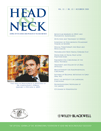Brachytherapy boost for T1/T2 nasopharyngeal carcinoma
Abstract
Background.
The aim of this study was to review our experience and demonstrate the safety of intracavitary brachytherapy (ICB) in patients with nasopharyngeal carcinoma (NPC).
Methods.
Hundred seventy-eight patients with early T1-2b disease underwent radical external beam radiation therapy (EBRT) followed by ICB boost. The primary tumor received 66 Gy of EBRT over 33 fractions using 6 or 10 MV photons. ICB insertions were performed 1 week later, delivering 10 Gy in 2 fractions over 8 days. Kaplan-Meier survival analyses were used to calculate the actuarial 5-year overall survival (OS), cause-specific survival, local control, and disease-free survival (DFS).
Results.
Five-year local control rates were 91.6%. OS, DFS, and cause-specific survival were estimated to be 85.25%, 81.7%, and 87.9%, respectively. Median follow-up was 86 months. There were no documented serious complications noted with ICB.
Conclusion.
ICB boost supplementing radical EBRT is an excellent method of enhancing local control for patients with NPC with early T1-2b disease. © 2009 Wiley Periodicals, Inc. Head Neck, 2009




